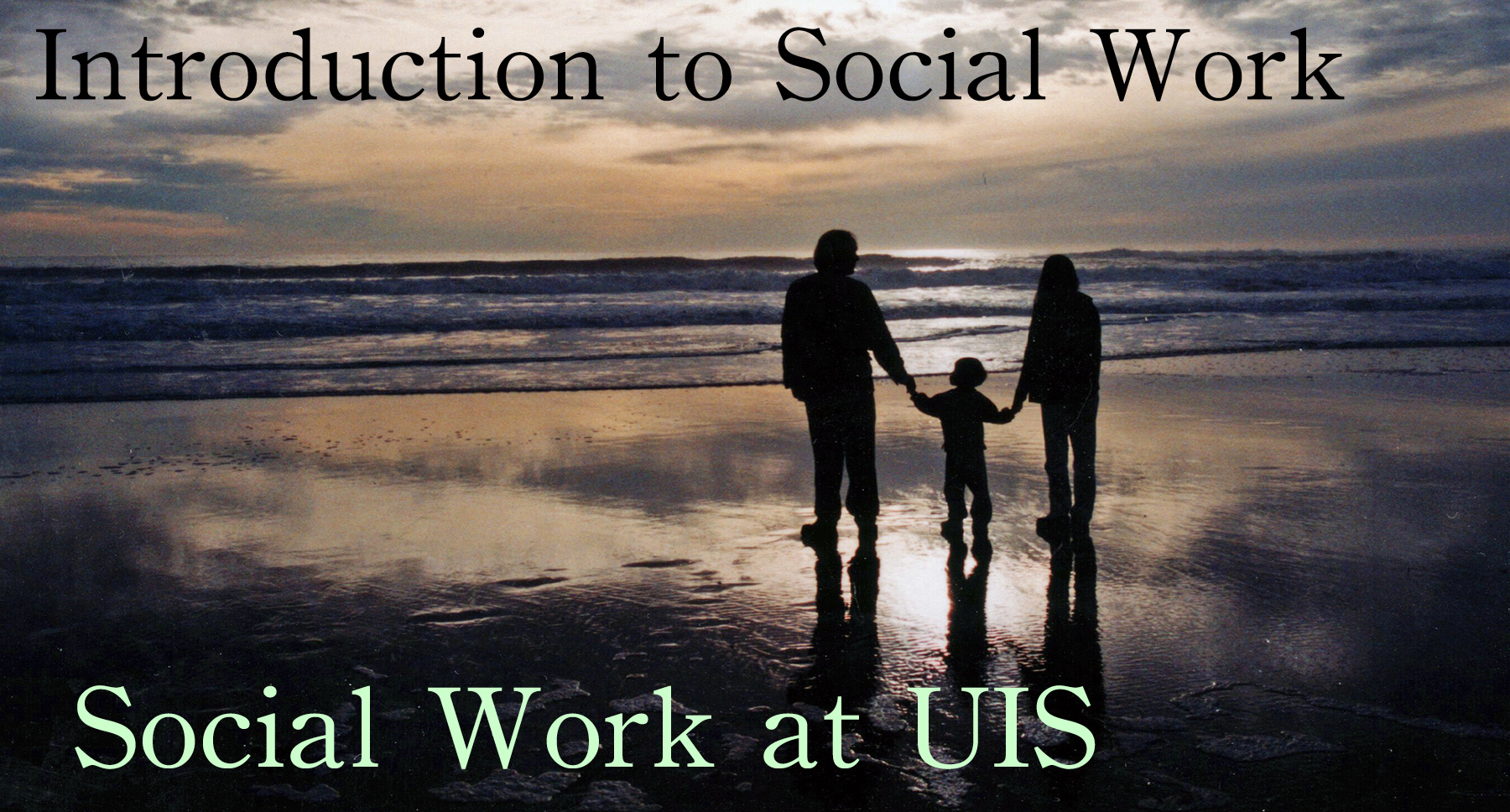Class meeting this week is on Zoom.
Class begins January 19th at 2:00 pm and lasts until 4:30 pm
Actual time in Zoom class should be 90 minutes to two hours, remaining class time should be devoted to the discussion boards for Session 1 in Canvas.
Class session lasts from January 19 at 2:00 p.m. to January 26 at 1:59 p.m.
This page describes what you should do in this first session.
Objectives of this session
- Meet your classmates; learn their names, something about their geographical and family background; something about their current study interests; and something about their interest in social work, and any experience they may have in service-related activities.
- Understand what you will be doing in this class; what books are we reading, what assignments will you be writing, what tests you will be taking, how you will graded, what grades you might expect, and be familiar with the schedule for when we are meeting face-to-face on campus and when we are meeting online. Learn about resources in the Canvas online learning environment.
- Begin reading Known to Social Services
- Understand what we mean by “profession” when we say that social work is a profession.
- Understand what we mean by “discipline” when we say that social work is an academic discipline.
- Understand what we mean by “science” and “scientific” when we say that social work is scientific or claim that we use science.
- Understand the purposes of social work.
- Understand the disciplinary areas of inquiry and the critical questions that social work addresses.
- Know that social work has various professional ethics and values.
Time Budget for 8 hours and 30 minutes
2h 30m Class meeting on Zoom and time spent on discussion boards.
1h 15m Go to the Mendeley website. Create a free account. Download and learn about Mendeley. Find an article in PDF or Word format, download it, and add it into your Mendeley library. Examine the automatically-generated fields and tags for the article you import, and correct those. In your Mendeley library, create a folder for “SWK Intro Paper” and put your article in that folder (you can remove it later).
1h Think about topics for your paper, and pick your topic
15m Order your books for this class
2h 45m Reading first 12 chapters (up to page 98) in Known to Social Services
1h First Week Activities and Assignments (there are two, described below)
What will happen in the class meeting at the start of this session?
During our 2.5 hours, I expect to use time in the following ways:
- I will introduce myself, so you can know more about me.
- I will ask each student to speak very briefly to give an introduction. I generally record these introductions and use them to create a class roster. I also tend to photograph the students. If you already have an avatar image or profile image you use in Canvas, I will use that, or if you send me an avatar image as an e-mail attachment or in Facebook Messenger or in Google Hangouts or uploaded in Canvas, I will use whatever you send me, but if you have no existing image and do not want the hassle of sending me an image, the class roster will use an image from a screen capture or photograph I take in the first session.
Your introductions should cover: 1) your name; 2) your family situation (family of origin and/or current household arrangements); 3) your interest in social work; 4) your reasoning for taking this class; 5) something about your sense of place, as, for example, where you grew up, or where you feel safe and comfortable at “at home” in general. You are also very welcome to name some of your interests, hobbies, and those sorts of things. Introductions take between 30 seconds and 3 minutes. Everyone is expected to introduce themselves to the class.
- I will review the syllabus, the assignments, my methods for grading, and the books we will be reading
- I will review the Canvas learning system we will use online
- I will describe and demonstrate the Mendeley application, a bibliographic and article storage tool
- I will ask you to come up with definitions or ideas about the meaning of terms “profession” and “discipline” and “science” and “scientific,” and then after you have provided your ideas to the class (probably through small-group discussion work) I will outline the ideas I brought. You may have better ideas than I do.
- I will ask you to create a list of what the purposes of social work ought to be, and what you think they actually are. I will then present some official definitions of the purposes of social work. We may discuss these.
- I will introduce the idea of professional values and ethics. I will introduce the National Association of Social Workers as an institutional entity. I will refer you to the NASW Code of Ethics. We will not go into detail; it’s my main goal for you to understand that there are codes of ethics, and have some general idea of why they are important
- I will describe the two exercises for this session.
What must you read this week?
Read the first 12 chapters (up to page 98) in Known to Social Services. I believe a careful reading will take more than 2.5 hours and less than 3 hours.
Your task to become familiar with Mendeley and your session activity assignments also require some reading.
What is the Mendeley thing?
I expect you to use a bit more than an hour to register with Mendeley, download the free software (there are versions for phone/tablet apps as well as desktop applications), and figure out the basics of how it works. My desire is that you all use Mendeley or some other similar system to collect your sources and any other interesting articles or papers you encounter this semester, and indeed throughout the rest of your undergraduate career. Mendeley will allow you to keep copies of many of your sources in one place using PDF or Word (or other formats), and organize them in folders. Mendeley will also help you generate APA-style reference lists, greatly reducing your labor in producing a well-prepared academic paper in this course.
If for some reason you do not want to use Mendeley, you are of course free to use other services and applications. Zotero, for example, is a useful extension for Firefox that can do much of what Mendeley does.
Activities
I expect you to use about an hour of your time in this session to do the following activities (homework assignments). As our initial Zoom session may be fairly short, these activities are considered part of the class session.
- Read the syllabus, and study it carefully. This may take as much as 25 minutes.
- Read the guide to assignments, which may take you about 15 minutes
- Reading this page (the session guide) may take about 10 to 15 minutes.
- If you use Google and want to communicate with me easily, you should add me as a contact so that you can send me messages on Hangouts.google.com. Or, if you use Facebook or Facebook Messenger, you may request to “Friend me” using my professional Facebook account (search for me as “Eric Joseph Orsay Hadley-Ives”). I check Messenger and Hangouts on a daily basis. I check my e-mail a couple times a week. I do not request that you friend me in Facebook, and if you do, this is only done to facilitate communication. I often turn off the “follow” function on students or former students so that my professional Facebook account feed will not be full of former students (I also have many professional contacts, colleagues, scholars, and social work friends in touch with me on that account). You are welcome to “unfriend” me when you complete taking courses with me. Our contact on Hangouts or Facebook is merely a tool for communication. I have personal accounts in Google and Facebook where I will not respond to friend requests from students (please do not try to “friend me” with my “Eric Hadley-Ives” account on Facebook). I agree that Facebook and Google are somewhat evil, and will not take it personally if you refuse to communicate with me using the tools furnished by those tarnished companies. I am also available on LINE, if you prefer to use that.
- You could help me by posting an introduction such as you made in the classroom, so I could simply copy and paste your introduction into the class roster. Also, you could help me by creating an avatar image and using it in Canvass, or sending me (by e-mail or Messenger, ideally) a photograph I could use for you in the class roster. During the pandemic we will have several classes online, and your online experience of the online learning will be enhanced if you and your classmates all have faces or images used in Canvass.
- You should post responses to some of the discussion prompts in Canvass, and also respond to some of your classmates when they post on Canvas discussion boards.
Working on your Assignments
I expect you to use about an hour of your time in this session to work on your paper, and no time on any tests.
- You should devote about an hour to thinking about a topic for your semester paper, make a decision about the paper topic (or the general area of a paper topic), and give some thought about what you want to learn and what you want to write about. Put about an hour into deciding what you will write about. You might use some of this time to consider ideas by looking at what you can find online with simple web-browsing.
- There is no test to take this week.
In addition, you have two special activity assignments for this week:
- You should devote about 30 minutes to looking up notices advertising positions for social workers and websites that estimate the salaries of social workers. What you find can be reported in the discussion boards (in Canvas) for session 1 or session 2. In the “interesting stuff” I share later you will find links to information about social worker salaries. Job advertisements can be found in sites such as the NASW Social Work Career Center, Monster, Indeed, Social Work Job Bank, Simply Hired, etc.
- You should devote another 30 minutes to looking up articles or essays that define profession or make the case that social work is a profession. Again, what you find will be incorporated into some of your posts in the Canvas discussion boards in the first couple sessions. In Social Work History, we learn about Abraham Flexner and his 2015 speech in Baltimore at the National Conference of Charities and Correction. The Professional Standards Councils (in Australia) and others have their own ideas about what a profession is. For example, Millett & Tapper (2015) considered the question, as did Jennings, Callahan, and Wolf (1987).
What are the discussion board questions this week?
Answer some of these questions in Canvas on the discussion board, and respond to your classmates.
-
Socializing Question 1:
Introduce yourself to the professor and your classmates. Tell us who you are. Tell us a bit about your family background. Give us some information about where you live and/or where you grew up. Say something about your interest in social work and why you are taking this course. Share with us something about things you like or what is going on in your life these days.
-
Socializing Question 2:
Share a photograph of yourself and/or photographs that would help us understand you. Help us interpret the photograph(s). What are we looking at in the photograph(s)? In what circumstances was/were the photograph(s) taken? What can we know about you by studying the photograph?
-
Discussion Question 3:
What does it mean when we describe social work as a profession? What is a profession, and how is social work a profession? You can answer off the top of your head just sharing your opinions or intuitive thoughts about this, or you can look up what other people have written. We’ll return to this question later in the semester and see how (if) opinions have changed.
-
Discussion Question 4:
How do the goals of social work correspond to your own values and your desire for meaningful work? If you were going to sum up the field of social word with very few words, how would you summarize the purposes or goals of social work?
-
Discussion Question 5:
As you look over the syllabus, what are some of your thoughts about this course? What do you like about it? What are you dreading? What questions do you have, and how do you think you will be able to succeed in this course?
-
Discussion Question 6:
As you read the first chapters in the book Known to Social Services what sort of an impression are you getting from the book? How do you describe the way the book is organized and written? The book is written by a practicing social worker, so in what ways do you think the author’s choices about characters, organization, and narrative reflect her experience as a social worker?
-
Discussion Question 7:
The book “Known to Social Services” is set in England, and is written by a British social worker. What do you notice in the first part of the book that seems different from what you would expect if the author were an American social worker? What does the book tell you about cultural differences between the British (especially the English) and Americans? And, in contrast, in what ways does the book show that the profession of social work transcends national and cultural boundaries, so that you recognize a “social work nature” in the English social work characters in the story?
-
Discussion Question 8:
The "Social Work Jobs" activity asked you to spend about 30 minutes looking for jobs in the social work field and consulting employment websites that offered estimates for salaries of social workers. Share what you found, and share your emotional reaction to this exercise. Comment on what your classmates found and what they are feeling about this experience.
-
Discussion Question 9:
The "What is a profession?" exercise asked you to spend 30 minutes looking up the idea of a profession and what it means to be professional, and then to consider how you think social work may be a profession. What did you find? What are some of the defining characteristics of a profession, and what do we mean if we claim/recognize that social work is a profession?












